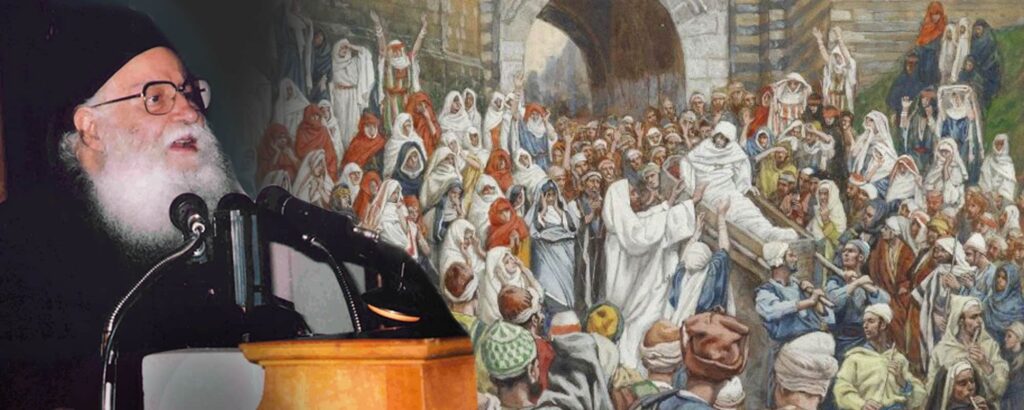
THE RESURRECTION OF OUR YOUTH
Homily of Blessed Elder Athanasios Mitilinaios
THE RESURRECTION OF OUR YOUTH
Luke (7:11-16)
The scene, my beloved, of the resurrection of the widow’s son in Naïn, is described simply, but very vividly. By His word alone, the Lord resurrected the lad who was the only child of that poor, widowed woman. He said to him, “Young man, I say to you, get up!” And the young man came back to life.
Fear seized the people and they were astounded, as the holy Evangelist Luke narrates to us. And the people, quite rightly, drew the conclusion: “a great prophet has arisen among us; God has visited His people” (v.16).
However, my beloved, the youth of today submit to a worse kind of death, spiritual death. When a young person dies a biological death, we all say, “O what a shame that a young person died”, and there is much mourning. How much more mourning should there be when not one person, but all the youth have died. It is appropriate to wail much over the death of the youth and to shed many tears.
When we walk down the street and see these living dead who belong to our youth, I assure you, the soul cries, certainly the souls of all who understand what has happened cry, those who can feel and mourn. They mourn when they see the dead young people who belong to the new generation passing by, those who are from our children.
If, however, my beloved, the Lord performed at least three resurrections (the number recorded in the holy Gospels), He probably resurrected many more spiritually dead people. He performed, and performs, and will continue to perform these resurrections. But let us take a closer look at how the holy text is narrated to us.
The holy Evangelist says that when that funeral procession was exiting the city gate of Naïn, the Lord was entering, accompanied by a very large crowd who admired Him and were following Him. The Lord, seeing all the mourning, said to the mother, “Don’t cry” and then, “approaching the casket”, the holy Evangelist says, “he touched it”, that is, the casket, and the corpse which was inside it. One sees here that Jesus Christ needed to approach the dead youth.
We often say, “Jesus must reach the youth.” What does this mean? That this approach is made by the grace of God when God gives His Grace. Just as the rays of the sun come down and touch objects and persons, so do the rays of divine Grace come and touch and caress us. But the second element must also come, the living word of God, offered by the Church.
So then, two elements are needed, the Grace of God and the living word of the Church of God. This living word, which comes from the outside and is offered, must find contact points. Notice, the Lord says, “touched” the corpse. Therefore, the word of God must find these contact points with the dead youth. However be careful here, because when we say “contact points” it does not mean that the Church will throw away its principles to win over the youth. There is a misunderstanding here. We say, “Let’s introduce instruments in church because our kids love music; it will be a way to attract them to our services.” So, because we understand they like the beat of rock music we are going to introduce rock music to attract the kids? This is surely a mistake, my beloved. “What do you do in church?”, we ask. “We find the word of God to be the contact point between the Church and the people of God, especially the youth.” There can be no compromise.
It has been proven abundantly that when the word of God is offered solid, pure and unadulterated, with much love, love that reaches and exceeds the bounds of self-sacrifice, then these contact points are created. We do not need to change anything. It is enough that this word of God be alive, pure, and, I repeat, with love; because the soul seeks what is true, what is offered sincerely and with love. Therefore, when we say “approach” and “find contact points”, in no way does this mean that we must make compromises and concessions, so that we end up reaching them through a dialectical way, and if we offer it this way it does not save. There is no need to offer the word of God if it does not save and offer a Church that does not save.
“Young man,” says the Lord. How beautiful this address of the Lord is. It is not his name, but his age that is revealed. Indeed, adolescence is the most beautiful age, but also the toughest and most difficult. It often happens that when one grows up he looks back on his life, to the days of his youth, and reminisces. However when he reflects how difficult his life was, he does not wish to go back to those days. He was faced with many existential problems.
A young man stops to consider his life in front of him and wonders who he is, who the others are, who God is, what existence means. Does he have a soul or does he not have a soul? What is the destiny of man? What is the meaning of life? These so-called “existential problems” are agonizing for a young person who ponders them. Even the most carefree youth has moments where he reaches a dead-end. He asks himself, “Is life worth living or not?”
There are job-related problems. We see this clearly in our children. What will they pursue? and how will they achieve what they wish to pursue?
There are moral problems. My oh my, are there moral problems!
There are problems of a spiritual nature: “What path will I follow? How will I be guided in my life?”
There are interpersonal problems. We emphasize this last one, because we see it vividly in our days. My beloved, we see young people not having a good relationship with their parents, with their home life in general, with the Church and with society. Anarchism, in those who are lackadaisical and say, “I don’t care”, “What does it matter”, “I am who I am and no one else in the world matters” creates terrible interpersonal problems. These problems are so great, that if they were the only ones we had, we would say that all the others are unnecessary. But we can say that all the other problems are found in this one, which is why we have the problem of acidic relationships.
But who will solve these problems? Who else but Jesus Christ? Our youth must realize that they labor in vain in their pursuits, in materialistic and political theories, in pleasures and drugs. They labor in vain. They will not find anything there. All such paths lead to a dead end, to chaos. Therefore the voice of the Lord comes:
Young man / young woman, I am talking to you, I who am the Incarnate Son of God, I who was a baby, I who was a teenager and a young man, who also passed through all the phases of human development, including the one you are now passing through; I am He who has learned from what I passed through, from what I have suffered. I who was tempted in life, I who was tempted by the devil (Mt. 4, Lk. 4) (who tempts you too), but whom I defeated. I have also overcome the world (Jn. 16:33), and I have overcome the devil by remaining without sin.
My young brother / young sister1, I am addressing you personally. You who live the spiritual crisis of your time so strongly. You who have deep experiences of sin. You who have even turned against Me. I am turning to you, My young brother / my young sister.
I consider you My friend, and I want to help you. No one else can help you and raise you up from being dead. Turn to Me, do not war against Me, but to listen to Me. What do I have to say to you? GET UP! Arise! Young man / young woman, I say to you, arise! Get up! Stand up! Yes! Get up! I who am your Lord, who created you to be in an upright posture, which is an expression; because you walk on your own two feet, it expresses that you yourself are king and ruler of everything. Yes. This is why you call Me Lord, “Lord of lords.” (Deut 10:17, Ps. 136:3, Rev. 17:14, 19:16, 1 Tim 6:15)
Who am I Lord over? The rulers of men. This is why you also call me “King of kings.” (Rev. 17:14, 19:16, 1 Tim 6:15) Who are my subjects as King? Those who rule. Who are those who rule? All the people. Because you humans are lords and kings, and I am Lord of lords and King of kings. This then, the upright posture, how I created you to be, is an expression of My own image in your being.
This upright posture moreover is an expression of one who searches for Me, your Creator. It expresses a way to live your life that is different from the life of the other animals. Therefore, being truly honored, you should not compare yourself with the animals, neither should you stoop to their level and wish to be like them. You are of noble origin. Do not fall into passions which equate you with the animals. I gave you all the good things of Creation. Look no further. I have given you wine to gladden your heart (Ps 103:15). Do not get drunk. I have given you bread to strengthen your heart (v.15). Do not be a gormandizer. I have given you all the beautiful things of life to enjoy, and your senses also. Do not gather in the fruit of prostitution. Do not go and become one who hunts for the pleasures of this life. Be careful. When you do these things, in spite of being an honored creation, you resemble the animals. But there is something more: You descend lower than the animals.
Death is what makes a man lay horizontal, when a man becomes a corpse. But I am Life and I am here to say to you: “Young man, get up! Young woman, get up! In your days, my young friends, people are “walking on all fours”, even though I created them to walk with two! And because they walk on all fours, they are not able to look high up. In fact, they only consider what they see; and what they don’t see, they ignore! All they see is whatever is down, because they are looking down all the time. They see whatever is material. Whatever they see that is passionate, that is how they live. Walking around on all fours, they cannot raise their mind and heart towards Me, to seek Me and to recognize Me. Young man / young woman, you are living in a time when people are walking on all fours.”
Beloved, this is how the Lord speaks to every young person, to our youth. But we, the grown-ups… woe to us grown-ups… we grown-ups are the ones who drive the youth to the cemetery to bury them. We are the ones carrying the caskets of the youth. The youth do not lose their lives by themselves. We the grown-ups have taken away the reins, we have removed the “do not’s”, the laws, the commandments, the guardrails and tell them that they are free, that they can do whatever they want and go wherever they wish. Even if they turn against us and spit on us, we still say to them: “You are doing fine, dear children!” We, then, are the ones who removed all these, the reins of God’s law and of reason and of humanity. And the youth have come to rebel.
But when the Lord, my beloved, approached the casket of that young man of Naïn, the holy Evangelist says: “The pallbearers stood still.” (v.14) Yes. Let us also stop the pallbearers who are carrying the youth. Yes, the youth, the new people, His “new people being built up”, as the Psalmist says (Psalm 101:19). We are the ones who lead the youth to physical as well as spiritual death with our morally corrupt laws, with our corrupted logic, with out corrupt teaching, with the deadly directions we give to our young men and women, with the apostasy we have created. Let us stop. Let us give Christ the opportunity to approach our dead youth and He will resurrect them and return them to the mother Church, their mother, their homeland. At some point may we realize that only Christ raises the dead, those who are physically dead and those who are spiritually dead, because He is the resurrection and the Life (Jn 11:25).
- Heb. 2:11 : “For both He that sanctifies and those who are sanctified are all of one; therefore He is not ashamed to call them brethren...”)


